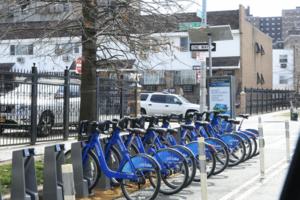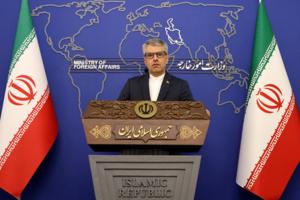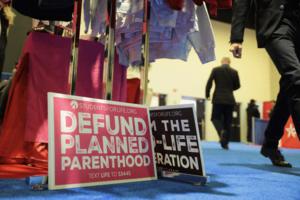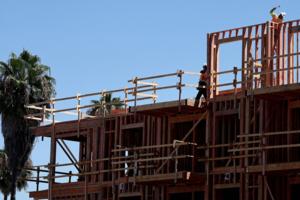Current News
/ArcaMax

Citi Bike to expand e-bike charging dock locations in Manhattan, Brooklyn
A year after the first Citi Bike e-bike charging docks were installed, New York City is expanding the number of bike-share charging hubs to keep pace with growing demand for electric cycles.
“Expanding our network of charging stations means riders will have better access to fully charged bikes, with fewer delays and faster service,” city ...Read more

Iran says still waiting to hear when next US talks will happen
Iran said it’s waiting for Oman to confirm when there will be a new round of nuclear talks with the U.S., while also saying it had nothing to do with Houthi missile strikes on Israel.
Iranian and U.S. officials were set to meet in Rome for a fourth round of negotiations last weekend, with Oman continuing its intermediary role. But the ...Read more

Israel vows to step up Gaza fighting ahead of Trump's Gulf trip
Israel’s security Cabinet voted to intensify military operations in Gaza and call up of tens of thousands of extra reservists, while also deciding on a means of distributing aid in the Palestinian territory.
The vote in the early hours of Monday followed a long discussion and was unanimous regarding the expansion of armed activities in Gaza, ...Read more
Orlando's tourist tax pulled in $40 million in March. Will it continue?
ORLANDO, Fla. — The tax on Orlando area hotel rooms just raked in the second-largest, one-month bonanza ever.
But optimism over Orange County’s near-record collection of $40.1 million in March, announced this morning, was tempered a bit by Comptroller Phil Diamond, whose office tracks the money generated by the 6% surcharge on hotel room ...Read more

Sean 'Diddy' Combs federal sex trafficking trial to begin jury selection
NEW YORK — Jury selection is set to begin Monday in the trial of hip hop mogul Sean “Diddy” Combs, who is accused of using his stardom and his perch as the powerful co-founder of Bad Boy Records to run an empire of sexual horrors, forcing women into sex trafficking and abuse at drug-fueled parties.
Combs, 55, has been locked up in ...Read more
Orlando's tourist tax pulled in $40 million in March. Will it continue?
ORLANDO, Fla. — The tax on Orlando area hotel rooms just raked in the second-largest, one-month bonanza ever.
But optimism over Orange County’s near-record collection of $40.1 million in March, announced this morning, was tempered a bit by Comptroller Phil Diamond, whose office tracks the money generated by the 6% surcharge on hotel room ...Read more

Asylum-seeking Honduran mother is still sitting in a Colo. ICE center six months after being detained
Carla Medina was delivering a DoorDash order to Buckley Space Force Base last year when she was detained by federal immigration officials. Six months later, the Honduran mother of two is still sitting in the detention facility in Aurora.
Her husband and children are on edge, and so is Medina. Although her entire family is moving through the ...Read more

Colorado police shot someone every 6 days in 2024, data shows
The first call came from her nephew. Then, news stations started reaching out, asking how she felt that the Aurora police officer responsible for her son’s death had not been charged.
“Right there, I swore to myself at that moment that I would never stop fighting until we got justice,” LaRonda Jones, the mother of Kilyn Lewis, said. “I ...Read more

Trump restores Title X funding for two anti-abortion states -- while wiping it out elsewhere
The Trump administration quietly restored federal family planning money to Tennessee and Oklahoma, despite court rulings that the states weren’t entitled to funds because they refused to provide women information about terminating pregnancies or abortion referrals on request.
The decision by the Department of Health and Human Services to ...Read more

The number of new apartments is at a 50-year high, but states expect a slowdown
More new apartments were built in 2024 than in any other year since 1974, but the Trump administration’s tariffs and deportations of potential construction workers, plus higher interest rates, could be a wet blanket on the boom.
A U.S. Census Bureau survey found almost 592,000 new apartments were finished last year, the most since the 1970s, ...Read more

23andMe users' genetic data is at risk, state AGs warn
The fate of more than 15 million customers’ genetic data remains in limbo after popular DNA testing company 23andMe filed for bankruptcy in March. The data is up for sale, stoking fears about how it might be used and prompting attorneys general from more than a dozen states to warn 23andMe users: Delete your data.
“Your genetic data is your...Read more

Antibody therapy explored by Pitt, other researchers to combat bird flu
While the risk of contracting and dying from the H5N1 avian flu remains low for humans, researchers continue to hunt for vaccines and treatments in case the virus mutates to spread more easily between animals and humans — or among humans themselves.
A team that includes researchers from the University of Pittsburgh and the National Institutes...Read more

University of Florida names sole finalist in presidential search
The University of Florida announced a sole finalist to be its next president: Santa J. Ono, president of the University of Michigan.
The announcement follows a search that began after former President Ben Sasse resigned last July, citing his wife’s health. After his resignation, reports of a surge in spending on administrative hires and ...Read more

Trump says he plans to reopen Alcatraz as a federal prison
President Donald Trump said in a Truth Social post that he has ordered the reopening of Alcatraz as a prison to “house America’s most ruthless and violent Offenders.”
Trump said he’s directing the Bureau of Prisons, Department of Justice, the FBI and Homeland Security to rebuild and substantially enlarge the former maximum security ...Read more

Trump plans 100% tariff on foreign movies, escalating trade war
President Donald Trump announced Sunday that he plans to impose a 100% tariff on films produced overseas, extending his restrictive trade policies on U.S. imports to the entertainment sector for the first time.
In a post on Truth Social, the American leader said he was directing the Commerce Department and his trade representative to “...Read more

Trump suggests some trade deals may come as early as this week
President Donald Trump suggested that his administration could strike trade deals with some countries as soon as this week, offering the prospect of relief for trading partners seeking to avoid higher U.S. import duties.
“It could very well be,” Trump told reporters on Sunday when asked whether any trade agreements were coming this week. He...Read more

Veterans could fill crucial holes in offshore wind workforce
Service members looking to leave the military could fill an important space in their workforce, according to offshore wind labor leaders and developers.
With more offshore wind units coming online over the next few years, more trade jobs will be necessary, according to a 2024 report from the Office of Energy Efficiency and Renewable Energy. The...Read more
Alaska child care advocates urge the Legislature to keep $14M in budget for sector in crisis
Child care advocates are urging the Alaska Legislature to include at least $14 million in this year's budget to help stabilize a sector in crisis.
Last month, the House passed its version of the operating budget with $7.7 million in grants for child care providers and $6.1 million in child care subsidies for families. The Senate's current draft...Read more

Missouri bus crash into ditch injures at least 32 people
At least 32 people were injured Saturday after a commercial bus crashed into a ditch about 70 miles west of St. Louis, Missouri, according to authorities.
The bus was traveling along Missouri Highway 100 west of Hermann when the driver veered off the road to the right, Missouri State Highway Patrol said in a crash report. The driver then ...Read more

Romania's far-right leader to face centrist mayor in runoff
A Romanian ultranationalist aligned with Donald Trump will head to a presidential runoff against the centrist mayor of Bucharest later this month after securing victory in a repeat election on Sunday, the latest blow to the nation’s ruling establishment.
George Simion of the ultranationalist Alliance for the Union of Romanians secured 40%, ...Read more
Popular Stories
- Preventing homelessness: the tough job of predicting who is at real risk
- Thousands of California prisoners falsely tested positive for opioids. Did it cost them their freedom?
- Romania far-right leader wins first- round vote, poll shows
- Minn. woman's fight to renew her 92-year-old mother's Medicaid highlights the growing problem of short-staffed counties
- With the state's grocery tax set to end, many municipalities are adopting their own, even as food prices climb





